Top 15 Defence Companies in India: Driving Innovation & National Security
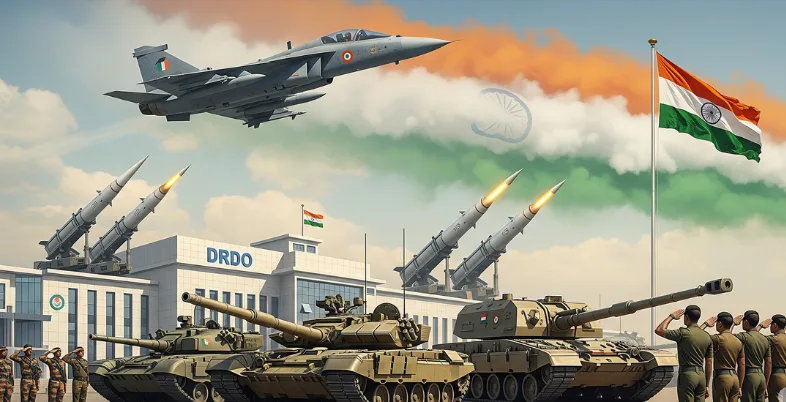
India’s defence industry is at the forefront in maintaining national security, strategic independence, and technology growth. With the strong focus on indigenisation under programs such as Make in India and Atmanirbhar Bharat, the nation is quickly emerging as a defence manufacturing hub of the world. The government’s drive towards indigenization has substantially increased domestic production, lowering import dependence and promoting innovation in land, air, sea, and cyber defence systems.
India’s defense manufacturing landscape is an energetic mix of Public Sector Undertakings (DPSUs), private defence majors, and burgeoning technology-driven startups. While DPSUs such as HAL and BEL have been the stalwarts of India’s defense infrastructure for decades, private firms and nimble startups are now leading future-generation innovations in drones, AI-powered surveillance, and sophisticated arms.
In this blog, we feature 15 top Defence Companies in India who are contributing significantly to the country’s strengthening defence capabilities. Ranging from traditional DPSUs to innovative private players, these firms are not merely serving the Indian Armed Forces but are also making a presence in international defence markets through exports and strategic partnerships.
Why India’s Defence Industry Growing?
1. Government Initiatives Fueling Growth
- Defence Procurement Policy (DPP): The Government has updated DPP (now Defence Acquisition Procedure – DAP) to give importance to indigenous design, development, and production (IDDP). It rationalizes acquisition procedures and prefers domestic production.
- Defence Industrial Corridors: Special Defence Corridors in Uttar Pradesh and Tamil Nadu are being established to offer infrastructure, investment schemes, and ecosystem benefits to defence producers.
- FDI Liberalization: Government has raised the Foreign Direct Investment (FDI) cap in defence sector to 74% through automatic route and up to 100% through government route, inviting foreign OEMs to set up manufacturing hubs in India.
- Make in India & Atmanirbhar Bharat Initiatives: Initiatives are designed to achieve self-reliance by encouraging indigenous production of defence platforms, subsystems, and components.
2. Indigenization Drive & Lesser Import Dependency
- Import Ban Lists (Positive Indigenization Lists): MoD has put out several lists prohibiting import of certain weapons, platforms, and sub-systems to encourage indigenous production.
- DPSUs and Private Companies With Emphasis on Indigenous Technologies: Institutions such as DRDO, HAL, BEL, and private companies are engaged in developing indigenous solutions to foreign defence systems.
- Local Value Addition Requirements: Defence procurement policies increasingly require higher indigenous content in defence contracts.
3. Growth in Defence Exports
- Export Promotion Policies: Government policies such as the Defence Export Promotion Scheme are helping Indian defence firms tap global markets.
- Improved Export Numbers: Defence exports from India have grown considerably over the past five years, and Africa, Southeast Asia, and the Middle East have emerged as important markets.
- Export of Domestic Platforms: Items such as the Akash missile system, sophisticated radar systems, patrol vessels, and surveillance systems are now being shipped.
4. Partnerships with International OEMs (Original Equipment Manufacturers)
- Joint Ventures & Co-Production: Indian firms are partnering with international leaders such as Lockheed Martin, Boeing, Airbus, Rafael, Elbit Systems, and more for technology transfers and co-manufacturing.
- Offset Obligations: Defence tender contracts require foreign OEMs to invest a share of the contract value within the Indian defence sector to induce local capability building.
- Technology Partnerships: DPSUs and DRDO are also increasingly getting into partnership with international OEMs for joint co-development of cutting-edge technology such as UAVs, missile systems, and electronic warfare suites.
5. Emergence of Private Sector and Startups in Defence Tech
- Private Defence Giants Enhancing Capabilities: Tata Advanced Systems, Adani Defence, Bharat Forge, L&T Defence are making investments in high-end manufacturing, R&D, and international partnerships.
- Start-up Innovations via iDEX: The Innovations for Defence Excellence (iDEX) programme is fostering start-ups and MSMEs to create game-changing technology in the areas of AI, robotics, autonomous systems, and cybersecurity.
- Niche Technology Focus: Private sector and startups are bridging key technology gaps in fields such as counter-drone systems, advanced imaging, simulation, intelligent surveillance, and AI-driven battlefield solutions.
Also Read: Top 10 Startup Companies in Hyderabad
15 Top Defence Companies in India
1. Hindustan Aeronautics Limited (HAL)

Website: https://hal-india.co.in
- Founded Year: 1940
- Headquarters: Bengaluru, Karnataka
- Key People: C.B. Ananthakrishnan (CMD)
- Core Specializations: Fighter Aircraft, Helicopters, Aerospace Systems, Avionics, UAVs, Maintenance & Overhaul
Hindustan Aeronautics Limited (HAL) is India’s oldest and most prominent Defence Public Sector Undertakings (DPSUs), with expertise in aerospace and aeronautics. HAL designs, develops, produces, and maintains aircraft, helicopters, avionics, and aerospace systems for the Indian Defence Forces.
Its marquee projects are the Tejas Light Combat Aircraft (LCA), Dhruv Advanced Light Helicopter (ALH), and the contribution to the Sukhoi Su-30MKI and Mirage 2000 programs. HAL has also partnered worldwide with companies such as Boeing and Rolls-Royce and is also increasing its function in unmanned aerial systems and defence exports.
2. Bharat Electronics Limited (BEL)
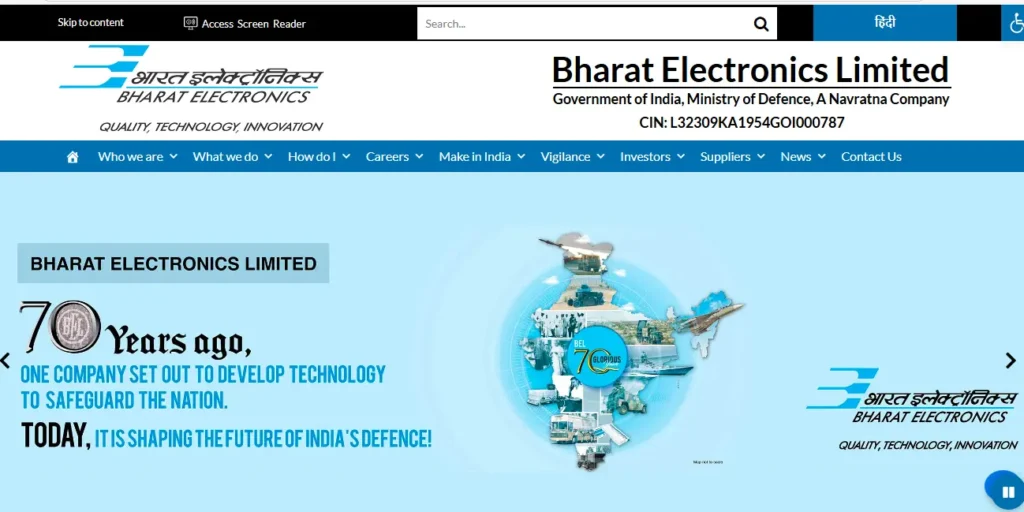
Website: https://bel-india.in
- Founded Year: 1954
- Headquarters: Bengaluru, Karnataka
- Key People: Bhanu Prakash Srivastava (CMD)
- Core Specializations: Defence Electronics, Radars, Missile Systems, Communication Systems, Electronic Warfare, Night Vision Devices
Bharat Electronics Limited (BEL), one of the major DPSU owned by the Ministry of Defence, is India’s largest producer of advanced defence electronics and communications systems. BEL serves significantly the Indian Army, Navy, and Air Force with offerings such as radars, electronic warfare systems, communication, night vision systems, and missile systems.
It is renowned for its contribution to initiatives like the Akash Missile System, LRSAM, and Battlefield Surveillance Radars. BEL works closely with DRDO and foreign defence companies and even exports to friendly countries. Focusing primarily on indigenization, BEL facilitates India’s defence self-reliance objectives with continuous innovation and technology improvement.
3. Bharat Dynamics Limited (BDL)
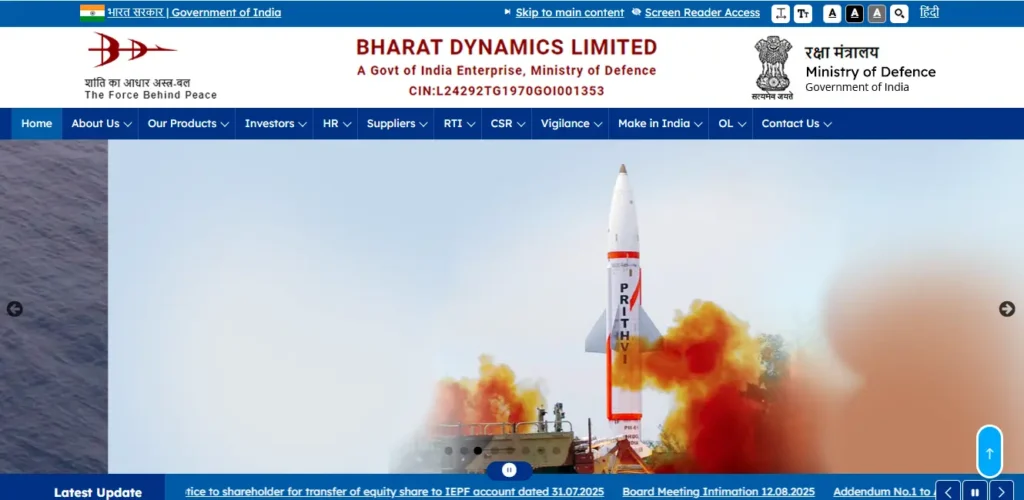
Website: https://bdl-india.in
- Founded Year: 1970
- Headquarters: Hyderabad, Telangana
- Key People: Commodore A. Madhavarao (CMD)
- Core Specializations: Missile Systems, Air Defence, Underwater Weapons, Guided Weapon Systems
Bharat Dynamics Limited (BDL) is one of the main DPSU with expertise in the production of guided missile systems and allied defence hardware. BDL is the key enabler of India’s missile manufacturing infrastructure, supplying critical systems such as Akash Surface-to-Air Missiles, MILAN Anti-Tank Guided Missiles, and BrahMos components.
It collaborates closely with DRDO and other partners in strategic missile research and development and has played a pivotal role in upgrading India’s missile indigenisation. BDL has also excelled in exports and is venturing into futuristic missile systems, underwater weapons, and air defence solutions, which are all devoted to national security.
4. Mazagon Dock Shipbuilders Limited (MDL)

Website: https://mazagondock.in
- Founded Year: 1934
- Headquarters: Mumbai, Maharashtra
- Key People: Sanjeev Singhal (CMD)
- Core Specializations: Warship Building, Submarines, Naval Systems, Ship Repair & Maintenance
Mazagon Dock Shipbuilders Limited (MDL), “Shipbuilder to the Nation,” is India’s premier DPSU for warship and submarine building. Based in Mumbai, MDL constructs a variety of naval vessels such as frigates, destroyers, and submarines for the Indian Navy. Some of the prominent programs are Scorpene-class submarines (INS Kalvari) under Project 75 and P15B destroyers.
MDL has been at the center of naval modernization and indigenization, revolutionizing India’s maritime prowess. With continuous partnerships and emphasis on exports, MDL is making inroads in worldwide ship-building while bolstering India’s strategic maritime defense ambitions.
5. Larsen & Toubro (L&T) Defence
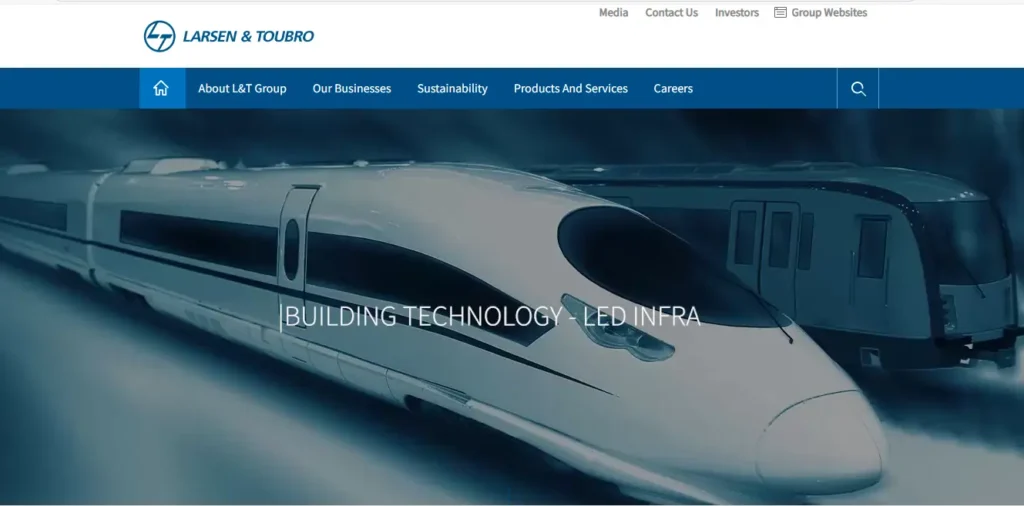
Website: https://www.lnt-defence.com
- Founded Year: 1938
- Headquarters: Mumbai, Maharashtra
- Key People: S.N. Subrahmanyan (CEO & MD, L&T Group)
- Core Specializations: Artillery Systems, Missile Launchers, Radar Systems, Submarine Modules, Defence Electronics, Land Systems
Larsen & Toubro (L&T) Defence is a premier private sector defence producer renowned for its multifaceted contributions to India’s land, naval, and missile systems. L&T Defence engages in combat vehicles, weapon systems, missile launchers, radar systems, and submarine hulls. It is a major partner in the K9 Vajra-T artillery, Pinaka Rocket Launcher, and naval platforms.
L&T also collaborates with DRDO and foreign OEMs, with growing focus on exports and technology transfer. Being a leading private contributor to Atmanirbhar Bharat in defence, L&T is renowned for its engineering prowess and indigenous production capabilities.
6. MKU Limited
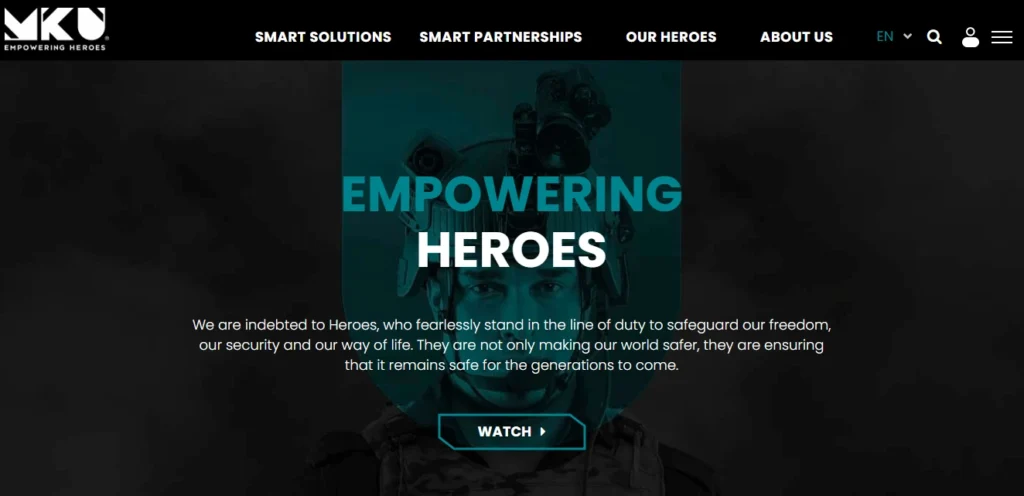
Website: https://www.mku.com
- Founded Year: 1985
- Headquarters: Kanpur, Uttar Pradesh
- Key People: Neeraj Gupta – MD
- Core Specializations: Ballistic Protection, Body Armour, Combat Helmets, Optronics, Night Vision Devices
MKU Limited is a world-renowned leader in ballistic protection and high-tech optronics solutions for military, paramilitary, and home country security forces globally. Established in 1985 with its headquarter in Kanpur, Uttar Pradesh, MKU has become a stalwart in creating cutting-edge defence technologies improving soldier survivability and operational performance.
It has expertise in the design and manufacture of body armour, bulletproof helmets, ballistic shields, and sophisticated night vision devices. Its top-of-the-line “Netro” line provides cutting-edge thermal imaging and night vision capabilities, which facilitate enhanced situation awareness in tactical missions.
7. Garden Reach Shipbuilders & Engineers (GRSE)
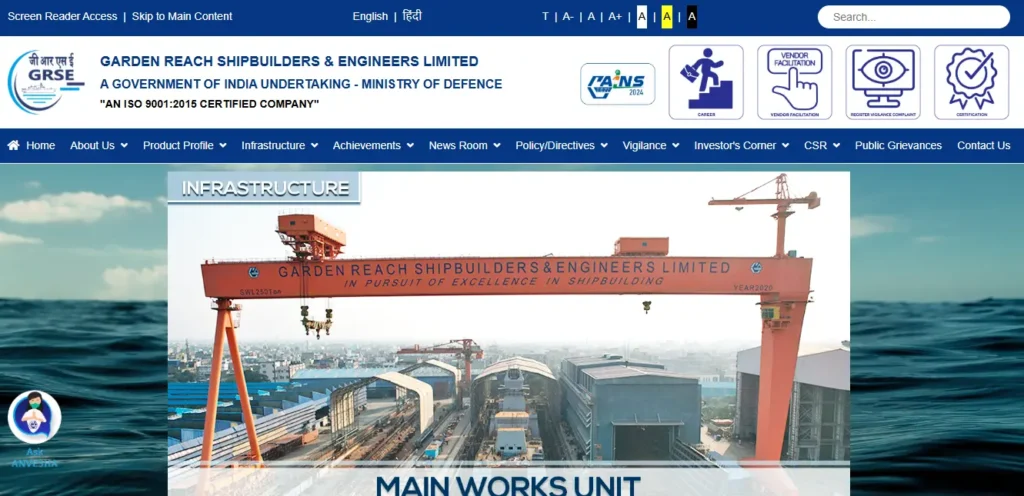
Website: https://www.grse.in
- Founded Year: 1884 (Nationalized in 1960)
- Headquarters: Kolkata, West Bengal
- Key People: Cmde P R Hari (CMD)
- Core Specializations: Frigates, Corvettes, Patrol Vessels, Landing Ships, Modular Shipbuilding
Garden Reach Shipbuilders & Engineers (GRSE) is a top DPSU with its headquarters in Kolkata, and it has expertise in designing and building warships, corvettes, and patrol vessels for the Indian Navy and Coast Guard.GRSE has a history of delivering more than 100 warships and has the reputation of being a modular shipbuilding leader and indigenizing key ship technologies.
Some of its prominent projects are Anti-Submarine Warfare Corvettes and Landing Craft Utility vessels. GRSE is responsible for bolstering India’s maritime defence while fostering export prospects in Southeast Asia and Africa.
Suggested Read: Anti-Phishing Software
8. Cochin Shipyard Limited (CSL)
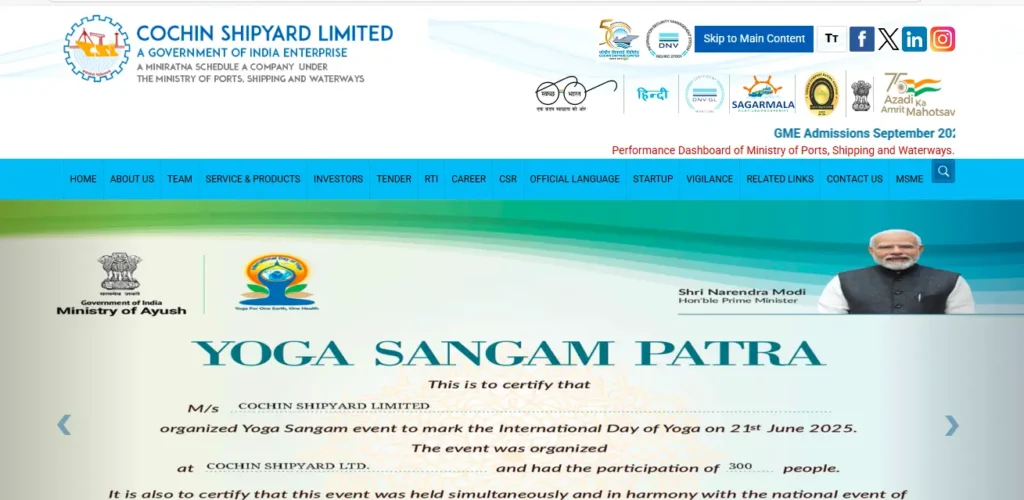
Website: https://cochinshipyard.in
- Founded Year: 1972
- Headquarters: Kochi, Kerala
- Key People: Madhu S Nair (CMD)
- Core Specializations: Aircraft Carriers, Offshore Support Vessels, Patrol Boats, Ship Repair & Maintenance
Cochin Shipyard Limited (CSL) is the largest shipbuilding and ship repair yard in India, having a strategic role in building large vessels and naval platforms. CSL is the trusted constructor of India’s first Indigenous Aircraft Carrier, INS Vikrant.
The company also builds offshore support vessels, fast patrol vessels, and offers comprehensive ship repair facilities to the Indian Navy as well as commercial customers. With state-of-the-art facilities and a focus on indigenization, CSL is at the heart of India’s naval growth and maritime self-sufficiency.
9. Defence Research and Development Organisation (DRDO)
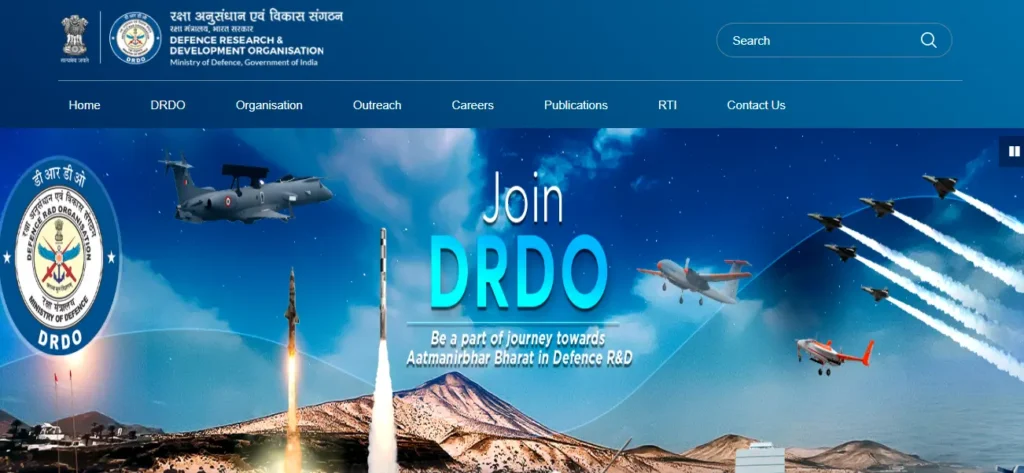
Website: https://www.drdo.gov.in
- Founded Year: 1958
- Headquarters: New Delhi
- Key People: Dr. Samir V Kamat (Chairman)
- Core Specializations: Missile Systems, Combat Vehicles, UAVs, Electronic Warfare, Defence Cybersecurity, Advanced Materials
Defence Research and Development Organisation (DRDO) is India’s lead defence R&D organization under the Ministry of Defence. DRDO leads the development of indigenous missiles, aircraft, armour systems, electronic warfare systems, and cybersecurity technology.
Its flagship projects are the Agni and Prithvi missile family, Tejas LCA, Arjun Main Battle Tank, and Akash Air Defence System. DRDO works together with DPSUs and private companies to take indigenous technologies to production, fueling India’s self-sustaining defence system.
10. Bharat Earth Movers Limited (BEML)
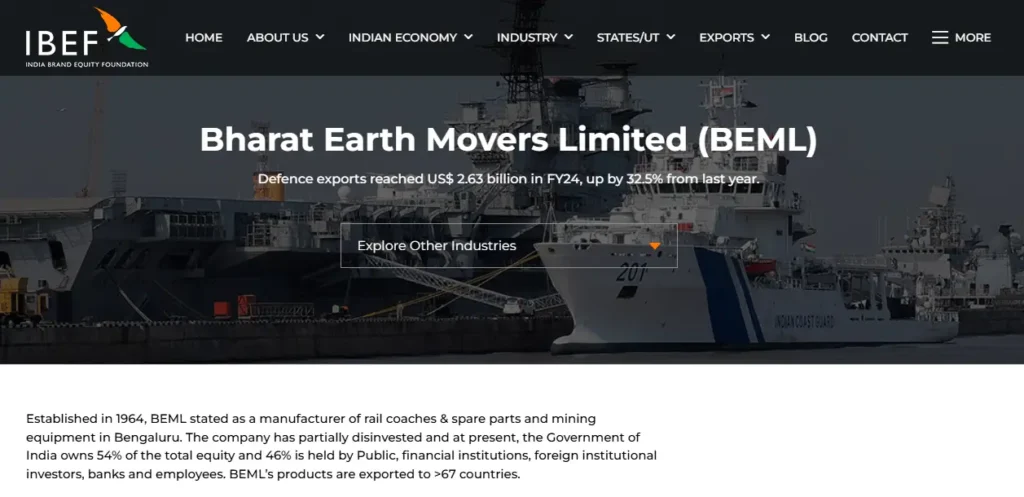
Website: https://www.ibef.org/industry/defence-manufacturing/showcase/bharat-earth-movers
- Founded Year: 1964
- Headquarters: Bengaluru, Karnataka
- Key People: Shantanu Roy (CMD)
- Core Specializations: Combat Vehicles, Military Trucks, Bridging Systems, Ground Support Equipment
Bharat Earth Movers Limited (BEML) is one of the major DPSUs producing heavy defence equipment, such as combat vehicles, military trucks, bridging equipment, and aerospace ground support equipment.
BEML has a reputation for producing Armoured Recovery Vehicles (ARVs), High Mobility Trucks (HMTs), and logistics solutions to support the Indian Army and Air Force. The indigenous production capability of the company is critical to India’s defence logistics and mobility ecosystem.
11. Tata Advanced Systems Limited (TASL)
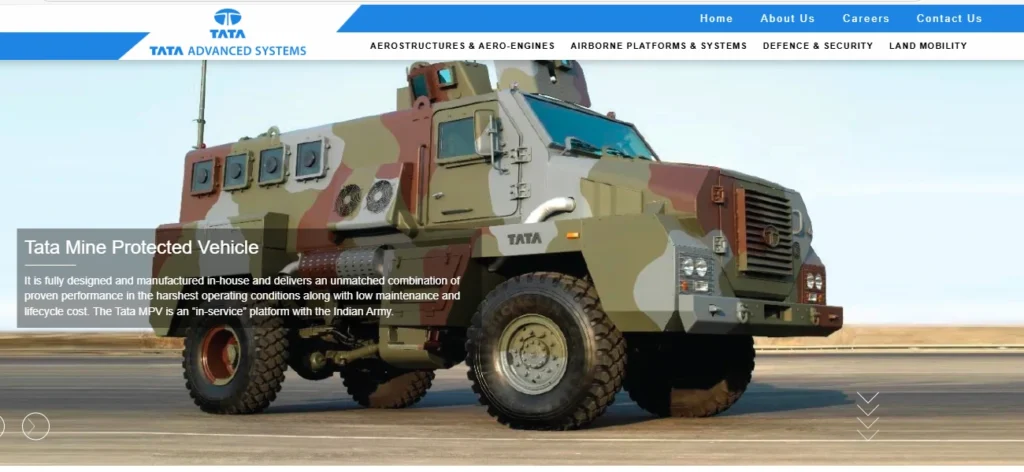
Website: https://www.tataadvancedsystems.com
- Founded Year: 2007
- Headquarters: Hyderabad, Telangana
- Key People: Sukaran Singh (MD & CEO)
- Core Specializations: Aerospace Structures, UAVs, Armoured Vehicles, Missile Systems, Defence Electronics
Tata Advanced Systems Limited (TASL), the Tata Group’s defence and aerospace business, is one of the major private sector players in India’s defence manufacturing space. TASL has a diversified product portfolio which includes aerospace structures, missile integration, UAVs, and military vehicles. TASL has strategic collaborations with international defence majors such as Lockheed Martin, Boeing, Airbus, and Raytheon, working towards key projects like the C-130J Super Hercules, Apache helicopters, and air defence systems.
TASL is also actively pursuing indigenous development programs, such as the Tata Kestrel armoured vehicle and surface-to-air missile systems. With its advanced facilities and R&D strengths, TASL is a key driver in India’s quest for self-reliance in defence production, besides being a global defence exporter.
12. Adani Defence & Aerospace
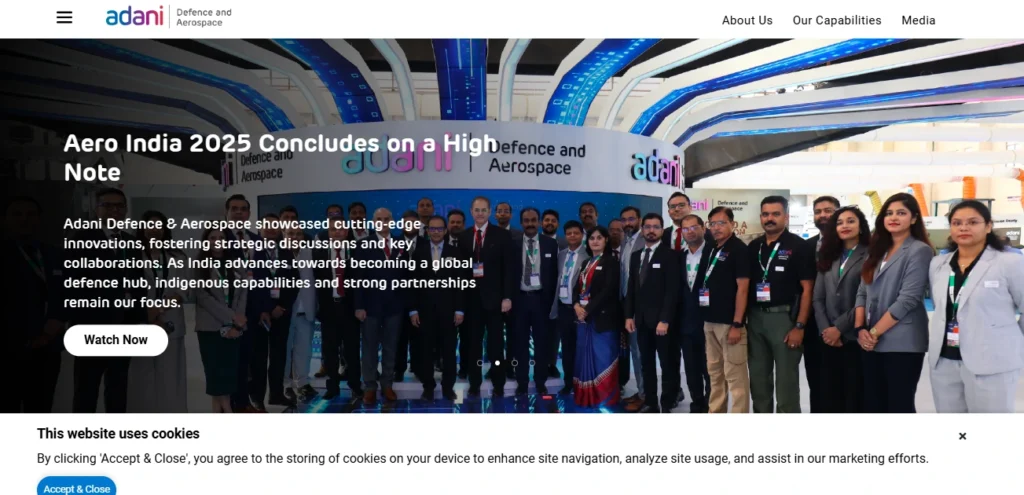
Website: https://www.adanidefence.com
- Founded Year: 2015
- Headquarters: Ahmedabad, Gujarat
- Key People: Ashish Rajvanshi (CEO, Adani Defence & Aerospace)
- Core Specializations: Drones, Counter-Drone Systems, Small Arms, Aerospace Components, Defence Electronics
Adani Defence & Aerospace, a unit of the Adani Group, is a rapidly growing private sector player in India’s defence manufacturing space. The company is developing capabilities in aerospace components, drones, small arms, and high-tech defence electronics.
With acquisitions such as Alpha Design Technologies and partnerships with international companies, Adani Defence has made significant strides in domains such as counter-drone systems, UAVs, and radar technologies. It is also establishing India’s largest integrated defence manufacturing complex in Gujarat. With a laser-like focus on Atmanirbhar Bharat, Adani Defence is determined to serve India’s strategic defence requirements while delivering products to export markets as well.
13. Kalyani Group (Bharat Forge Defence Systems)
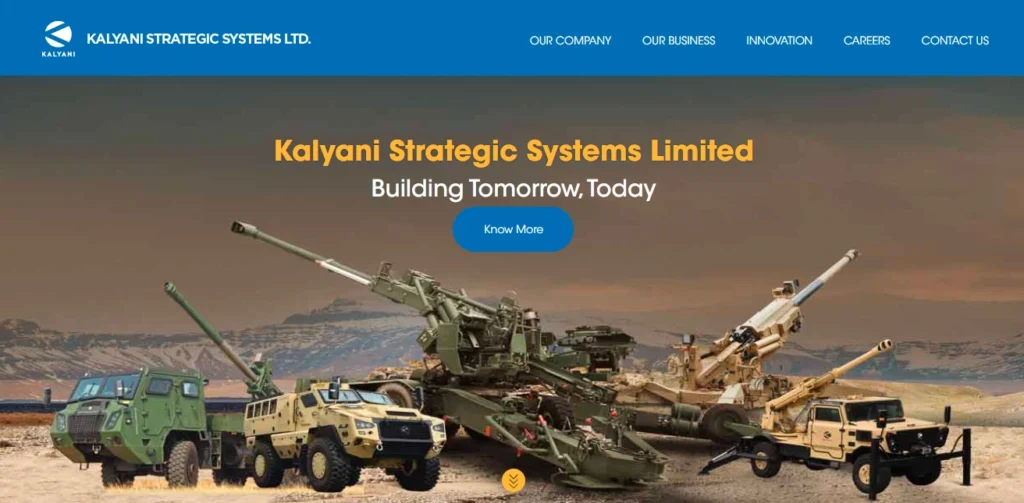
Website: https://www.kssl.in
- Founded Year: 1961 (Bharat Forge)
- Headquarters: Pune, Maharashtra
- Key People: Baba Kalyani (Chairman & MD)
- Core Specializations: Artillery Systems, Armoured Vehicles, Aerospace Components, Defence Forgings, Land Systems
Kalyani Group, via Bharat Forge Defence Systems, is a leading private sector player in India’s defense manufacturing with high expertise in engineering and metallurgy. Bharat Forge has built indigenous platforms such as the Bharat 52 Artillery Gun System and Kalyani M4 Armoured Vehicle to meet India’s key needs in land systems and artillery.
It produces aerospace components and key defence forgings as well. With partnerships with international defence majors and heavy investments in R&D, Bharat Forge Defence is at the forefront of India’s quest to establish a strong indigenous defence industrial base.
14. Data Patterns (India) Ltd.

Website: https://www.datapatternsindia.com
- Founded Year: 1985
- Headquarters: Chennai, Tamil Nadu
- Key people: S. Sundararajan (MD & Chairman)
- Core Specializations: Radar Systems, Electronic Warfare Systems, Avionics, Space Electronics, Defence Electronics Manufacturing
Data Patterns is a top defence and aerospace electronics solutions company, with expertise in indigenously designed electronic systems. The company was established in 1985 and has its corporate office in Chennai. Data Patterns delivers design-to-delivery solutions for radar systems, electronic warfare, avionics, space systems, and test equipment.
Data Patterns collaborates intensely with DRDO, ISRO, HAL, and Indian Armed Forces, supporting key defence programmes with indigenous technologies. The company’s fully integrated manufacturing facility facilitates quick prototyping, enabling shorter time-to-market for key defense applications.
15. Tonbo Imaging
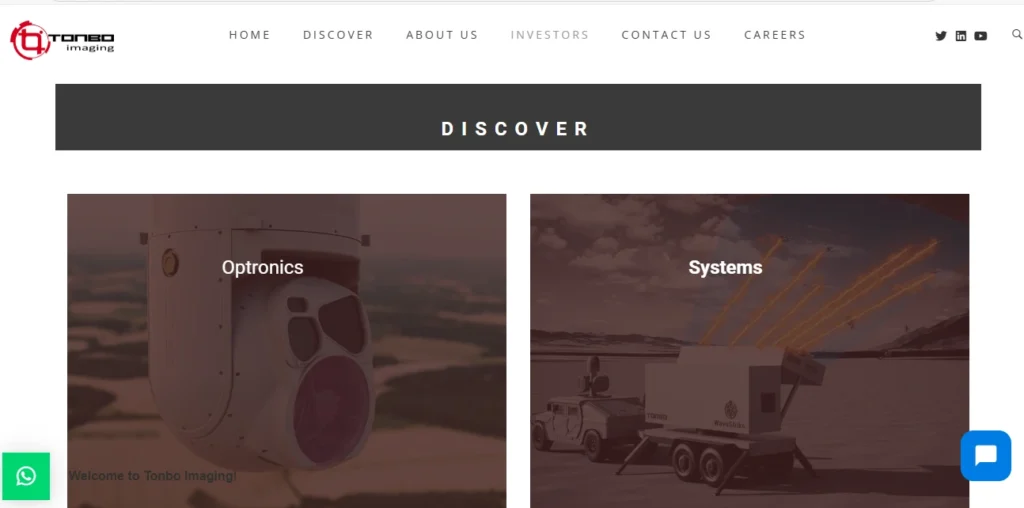
Website: https://tonboimaging.com
- Founded Year: 2008
- Headquarters: Bengaluru, Karnataka
- Key People: Arvind Lakshmikumar (Founder & CEO)
- Core Specializations: Electro-Optics, Thermal Imaging, Night Vision Systems, AI-Driven Surveillance, Battlefield Reconnaissance
Tonbo Imaging is a path-breaking defence technology startup that deals in cutting-edge imaging and electro-optics solutions.The firm produces next-generation thermal imaging, night vision systems, and AI-based surveillance platforms applied in land, air, and naval operations. Tonbo products are targeted for target acquisition, border patrol, and battlefield reconnaissance.
It supplies to the Indian Armed Forces and exports to more than 20 countries. Through the integration of AI, computer vision, and optics, Tonbo Imaging is transforming India’s situational awareness capabilities and greatly contributing to the Atmanirbhar Bharat movement in defense technology.
Public Sector vs Private Sector in Defence
1. Dominance of DPSUs (Defence Public Sector Undertakings)
- Core Backbone: DPSUs such as HAL, BEL, BDL, MDL, GRSE, CSL, and R&D entities such as DRDO are the backbone of India’s defence industrial base, undertaking projects of national strategic significance.
- Large-Scale Platforms: DPSUs deal with producing complex platforms—fighter aircraft, warships, submarines, missile systems, and sophisticated radars.
- Government Funding & Long-Term Projects: DPSUs enjoy steady government funding and are entrusted with long-term, high-investment programs (e.g., INS Vikrant, Agni Missile Series, Tejas LCA).
- Technology Custodianship: They are the custodians of sensitive defence technologies in national hands.
- Challenges: DPSUs have also been criticized for bureaucratic red tape, inflexibility, and lesser agility in adopting new cutting-edge technologies compared to the private sector.
2. The Role of Private Sector in Niche Innovation
- Agile & Tech-Driven: Private sector entities such as Tata Advanced Systems, Adani Defence, Bharat Forge, Alpha Design, and Tonbo Imaging introduce agility, innovation, and international collaborations into defence production.
- Focus Areas: Private sector is leading in drones (UAVs), counter-drone systems, cyber defence systems, AI-based surveillance, sophisticated electro-optics, smart weapon systems, and high-performance materials.
- Strategic Alliances with World OEMs: Companies are tying up with world defence leaders (e.g., Tata-Lockheed Martin, Adani-Elbit Systems, Bharat Forge–Elbit) to produce and co-develop world-class defence products within India.
- Fast Prototyping & Product Innovation: Mid-sized and startups are capable of fast product iteration cycles, system modularity designs, and delivering cutting-edge technologies that address new battlefield requirements.
- Boost to Defence Exports: Various private companies are presently engaged in defence products’ exports (UAVs, electro-optics, precision components) to foreign markets, boosting India’s defence export profile.
3. Public-Private Collaboration Models (PPP Initiatives)
- Strategic Partnership Model (SP): Incentivizes private industry to collaborate with foreign OEMs and DPSUs for making sophisticated platforms such as submarines, combat aircraft, and helicopters.
- Defence Industrial Corridors: Setting up Defence Corridors in Uttar Pradesh and Tamil Nadu offers infrastructure, incentives, and ecosystem facilitation for private defence production.
- Make-II Projects under DPP: Enables private companies to create prototypes for Indian Armed Forces needs without the government but with guaranteed procurement if successful.
- DRDO’s Transfer of Technology (ToT) to Private Companies: DRDO is increasingly transferring matured technologies to private players for mass production and integration.
- Offset Policies: Foreign OEMs are compelled to invest in Indian defence industry (under partnership or joint ventures) as a part of defence procurement contracts, thus enhancing private sector capability.
- Co-Development & Co-Production with DPSUs: DPSUs are collaboratively venturing with private companies for joint R&D and manufacturing to leverage scale (public sector) with nimbleness (private sector).
- Start-up Innovations under iDEX: The Innovations for Defence Excellence (iDEX) scheme assists start-ups and MSMEs in creating innovative technologies for defence purposes with funding and mentorship support.
4. Future Outlook: Synergy Between Public & Private Sectors
- Balanced Ecosystem: India’s defence sector is shifting towards a balanced ecosystem wherein DPSUs undertake large, strategic programmes and private companies undertake quick innovation and niche technologies.
- Collaborative R&D: More collaboration in R&D is facilitating quicker commercialization of domestic technologies.
- Enabling Atmanirbhar Bharat Vision: The joint action of both sectors is the key to India becoming self-reliant in key defence technologies and moving away from imports.
- Rise of Defence Tech Startups: The startup ecosystem is supplementing DPSUs and major private players by providing disruptive solutions in areas of AI, robotics, autonomous systems, and cybersecurity.
Conclusion
India’s defence industry is transforming fast into an innovation-driven and self-reliant ecosystem. While DPSUs remain the bedrock of strategic defence platforms such as aircraft, warships, and missile defence systems, the private sector and startups dominate innovation in drones, AI, cybersecurity, and smart defence technology. Government programs like Make in India, Defence Industrial Corridors, and FDI easing have built an ecosystem where public and private sectors collaborate to augment India’s defence capability.
With a strong thrust towards indigenization and increasing defence exports, India is poised to become a defence manufacturing hub of the world. State-sponsored DPSUs’ synergy with nimble private innovators will be the driver towards strategic self-reliance and global competitiveness in the coming years.
FAQs
How is the private sector contributing to India’s defence industry?
Private defence players like Tata Advanced Systems, Adani Defence, Bharat Forge, and new-age startups are innovating in niche technologies like drones, AI-based surveillance, cybersecurity, and advanced materials. They are also partnering with international OEMs to introduce cutting-edge technologies in India.
What government initiatives are driving indigenous defence manufacturing?
The flagship initiatives among them are Make in India, Atmanirbhar Bharat, Defence Industrial Corridors, Strategic Partnership Model (SP), liberalization of FDI, and the iDEX program for boosting domestic defence production and decreasing import dependency.
What is the future of India’s defence industry?
With firm government support, growing private sector involvement, and growing global tie-ups, India’s defence sector will become one of the key global manufacturing hubs, attaining more self-reliance and enhancing exports.
Which defence manufacturing sectors are Indian startups concentrating on?
Indian startups in the country’s defence industry are developing technologies such as unmanned aerial vehicles (UAVs), counter-drone solutions, high-end imaging solutions, AI-based surveillance, electronic warfare capabilities, and cybersecurity technologies. Programs such as iDEX are nurturing this ecosystem.
What is the Strategic Partnership (SP) Model in the defence policy of India?
The SP Model promotes private Indian companies to partner with international Original Equipment Manufacturers (OEMs) for co-production and co-development of significant defence platforms like submarines, fighter aircraft, helicopters, and armoured vehicles, building domestic capabilities.